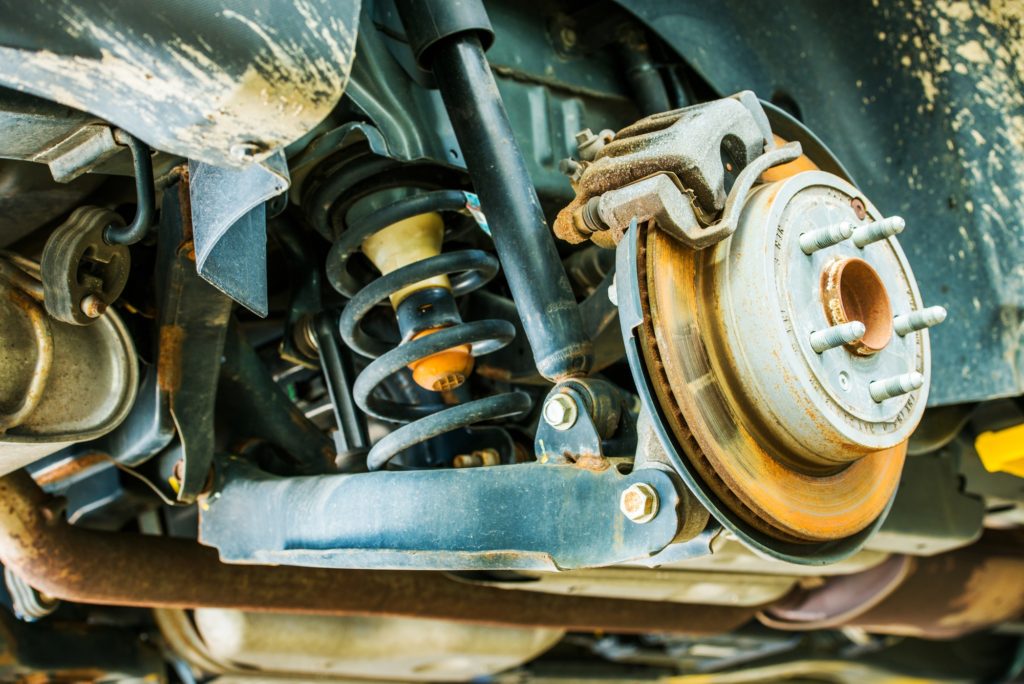Shaken, not stirred — is not how you want your car to feel. If you step on the brakes and feel shaking or vibration, it’s a sure sign you should head to a mechanic for repairs. Not only is shaky braking an annoyance, but it can also pose a safety risk. Depending on the underlying cause, you may find yourself with less effective brakes, unsteady suspension, or less precise steering.
A trusted mechanic should carefully inspect relevant systems to diagnose which repairs are necessary to restore a smooth ride.

Several Systems Impact Your Car’s Braking
While your first thought may be that you’re due for a brake repair, there are a number of possible problems that can cause this change in performance. Any component or system that relates to your car’s handling could potentially cause vibration while driving. Issues related to the suspension system, steering, or brakes can all potentially cause similar symptoms, a close inspection of each system should be done to make sure of an accurate diagnosis.
What Can Cause Shaking or Vibration While Braking?
Though several components in different systems may cause shaky braking, which specific causes could it be? If you’ve recently been in an accident, bumped a curb, had new brake pads installed, or gone too long between brake services, it’s possible you’ve found the underlying cause.
New Brake Pads Being Worn In
Did you recently have your brake pads replaced? Surprisingly, sometimes new brake pads can cause vibration as they break in. In this case, give it some time and use to see if it improves. If the vibration stays the same or gets worse, you likely need a different repair. However, if the vibration starts to go away, it’s likely your new brake pads just need to be broken in.
Worn or Misaligned Brake Pads
On the other hand, over-worn or misaligned brake pads can also cause vibration or shaking while braking. Take a look at your car’s brake pads and rotors — if they’re 1/8” or less in thickness, it’s time to consider having them replaced. Brake pads that are incorrectly installed can cause inconsistent contact between the pads and rotors, leading to shaky braking.
Warped Rotors
When you press the brake pedal, it causes the brake pads to press against rotors. The resulting friction is what slows your vehicle. Whether from use, stuck debris, or improper installation of parts, the rotors can become warped. When this happens, the uneven surface means brake pads don’t make consistent contact. To fix this brake problem, you’ll have to either have new rotors installed or have your current rotors leveled.
An Overdue Tire Alignment Service
Every year or two, it’s time to schedule a tire alignment service. With normal use, the angle of your car’s tires gradually shifts, eventually causing changes in your car’s handling. Signs you’re overdue for a tire alignment include pulling to one side, difficult handling, and vibration while driving. There may also be uneven tire tread wear that can limit traction on the road and shorten the lifespan of your tires.
A Loose Tire
Especially if you recently had your tires rotated or new brake pads installed, it’s possible your car vibrates when braking because one or more tires are loose. If a tire’s lug nuts are not properly tightened, it can cause it to wobble, making it feel like your vehicle is shaking or vibrating. This can be especially noticeable when slowing your vehicle, rather than going at a consistent, faster speed.
Faulty Steering Parts
Other car problems can make vibration more noticeable as you slow, too, including a faulty steering component. If your car has a loose control arm or damaged knuckle, it can cause a noticeable shake while you drive. Over time, steering problems will to grow and can make it more difficult to drive safely, so it’s important to have diagnostics and repairs done soon.
A Bent or Damaged Axle
Were you recently in a fender bender? Maybe you cut a corner too closely and hit the curb? Or couldn’t dodge a big pothole? If so, it’s possible your car vibrates because of a bent or damaged axle. Even if it didn’t feel like much when it happened, any of those events can be enough to bend an axle shaft, causing a vibration that can be more noticeable when slowing your vehicle.
Restore Healthy Brakes with a Visit to Your Local AAMCO
You don’t have to deal with vibration every time you brake. Visit your local AAMCO Tallahassee auto shop and our expert mechanics will diagnose which repairs will restore a smooth ride for your vehicle. Schedule your appointment with us today.
